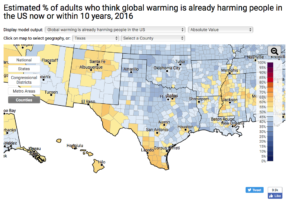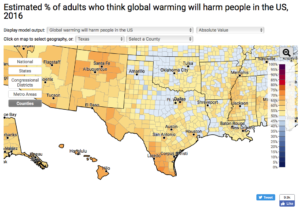I am always intrigued by the role — if any — that scholarship plays in how Americans evaluate their world. So when researchers at Yale published the results of their nationwide study of attitudes towards climate change, I was more than curious to read their report. (See the NYT piece.)
At a very high level, the results reflected what we might expect: there is a direct correlation between wealth, education, and trust in climate science. Wealthy coastal regions, east and west, were right up there at the top. The middle of the country, less so. The south even less.
The surprise (at least to me) is that most Americans everywhere — blue, red, purple — in fact, greater than fifty percent even in the deep south “support strict CO2 limits on existing coal-fired power plants.” Nationwide the numbers are even higher: sixty-nine percent. Wow! Even in solidly red voting districts! Go figure.
Does race make a difference? Unfortunately, the researchers did not test this hypothesis. And, yet, if we look, for example, at the Texas southwest border with Mexico, an economically depressed region where Hispanic Americans make up greater than fifty percent of the population, we encounter numbers seen elsewhere in the study only in African American and wealthy European American voting districts. Which could suggest — again — that race matters.

It is also noteworthy that even in coastal communities that have been buffeted by extreme weather — along the coast between Corpus Christi and Houston — respondents were less inclined than their neighbors along the border to feel that global warming was already or within 10 years will be harming people in the US. Will it eventually harm people in the US? Most Texans say “Yes.” But again, notably, not most Texans who live in or around Dallas-Ft Worth or the wealthier districts just east of Houston.

So, if greater than fifty percent of voters — everywhere — recognize that CO2 and coal-fired power plants are causing catastrophic climate change, this must mean that the Republicans are in for a rude awakening at the polls after they eliminate President Obama’s restrictions on carbon emissions, right? Well, no. And here’s why; Bob Inglis, a former Republican congressman from South Carolina, took that tack and he lost:
Bob Inglis . . . warned that committed activists — like the Tea Party — can shape politicians’ approaches to issues like climate change. “Those are the ones who can take you out at the next primary,” he said. He lost his primary in 2010 to Trey Gowdy, a Tea Party candidate who attacked his climate views.
Which is to say, poor (and poorly educated) European American voters join their plutocratic representatives on what they perceive to be economic issues: caps on CO2 are “job killers.” When the Koch brothers and Betsy DeVos carpet bomb poor European American voting districts with adverting dollars associating carbon controls with high un- and underemployment, poor European Americans listen and vote with what remains of their pocketbooks and wallets.
For me, this may be the strongest case anywhere for Democrat-leaning plutocrats to rethink their rhetoric (and, of course, their action) around income inequality and its effects not simply on voting patterns, but on the survival of human beings on planet Earth. Blame them if you like, but people who are underemployed and unable to take full advantage of the American dream are unlikely to hear any other message. Yes, the 45th President packed his administration with plutocrats from top to bottom. Yes, the fortunes of his European American supporters will not improve under his policies. Yet, since he at the very least mirrors (models?) their hatred and anger, they clearly trust him more than they trust well-graduated Ivy-leaguers who counsel calm and understanding from the safety of their Goldman Sachs portfolios. Hate trumps love; not the reverse.
Love would only trump hate under the condition that working families actually felt that it was improving their lot in life in tangible ways, now, not in ten years. What’s at stake? Only the world.



